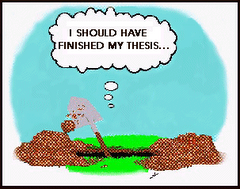cross-posted over at Wind Farm
i'm currently working on my prospectus for my diss at Temple Univ. i'm a comp/rhet/literacy studies guy, and i’m having a small issue with getting started on my prospectus. so, if i may, i'd like to briefly describe my project to see what you guys think.
I’m interested in theories/models of reconfigured classroom spaces (Dewey, Hawhee, Sirc, and even J. Rice are examples). “Reconfigured” b/c “traditional” models of classroom instruction are “unnatural” (see Dewey) and inefficient/ineffective for many students (see Hull and Schwartz, Mahiri, and Smith and Willhelm). What I’d like to do is use student-athletes as a subject site for examining how humans learn in non-traditional spaces. The theoretical framework that I plan to use includes, primarily, Vygotsky’s notions of concept formation in the development of higher mental processes, but with a twist: Lakoff and Johnson (Philosophy in the Flesh) and Maurice Merleau-Ponty’s (Phenomenology of Perception) theories of phenomenology which articulates that concept formation in the mind is actually an embodied phenomenon. I THINK that student-athletes and coaches might be a really productive sight of inquiry and possibly serve as a sort of model for effectively reconfiguring classroom space. Now, there is a danger in holding onto this assumption before starting my research (whatever form that takes – though it’s likely to be ethnographic in “intent”); obviously I’m going to need a really good and “objective” Grand Tour Question to help in mediating this bias (which is partly formed due to a small pilot study I conducted about 2 years ago).
Now that I have provided a perfectly ambiguous summary of my dissertation dreams, I present to you my question: What ideas come to mind for a good GTQ? This is not a simple question by any means, but I don’t expect you to ruminate for hours over it – just an idea or two that pops in your head. By way of example, my committee chair suggested that I explore this topic through an examination of “motivation”: how/in what ways is a student motivated to learn? how/in what ways is a student/athlete motivated to learn? Another example is the GTQ for my pilot study: “How do you learn stuff?” Originally it was something like, “How would you describe the mind/body synthesis or lack thereof that you experience in classroom learning situations viz. athletic learning situations?” but the 17 year old boys to whom I posed this question looked at me like I was an alien when I uttered something similar to those words. Since my access to them was limited, my quick goat-thinking helped me come up with, “Uh, how bout you just start with telling me how you learn stuff.” Whatever the GTQ eventually is, I’m inclined to have it be as simple/basic as possible (yaknow, K.I.S.S. – keep it simple, stupid).
one last thing: for a long time now I’ve been thinking about how my diss would go – the methodology, the subjects, the site, the data collection and analysis, etc. The more I think about what I thought my project would be, the more I lean towards practicality. And then I think about how I’m already ready to be done with it. That last statement can be as complex or simple as you want it to be; though, what I really mean by all of it is I’m not so committed to any particular aspect that I wouldn’t consider making minor or major changes. I’ve done what might be considered a substantial amount of ground work already. So, in a nutshell, I guess what I’m aksin for is some help in shaking things up… After all, the best dissertation is a done dissertation. yaknowhatimean?
Wednesday, January 10, 2007
i suppose i should oblige billie as well...
Posted by
chris
at
1:43 AM
![]()
![]()
Labels: disseration, GTQ, prospectus
Subscribe to:
Post Comments (Atom)


4 comments:
Chris, I don't have any handy sources that I can refer to offhand(other than the Matt Johnson's dissertation I mentioned the other day), but when I think about space, the space of a classroom, and students learning in a specific space, and I think about the majority of students I teach (student-athletes). For them, space is an important issue.
Anecdotally, I taught in a strangely configured computer lab this last semester, and the student-athletes were of a particular size, and they didn't fit well in the lab space. There were a lot of them in a smallish room. Not a lot of learning went on. In part, this was because of the space issue. The students needed room to move, to stretch, to lean over and talk with a neighbor, to pass papers around the room, whatever. There just wasn't enough room for THEM to move. Traditional students (traditionally-sized students) were find in this space, but the student-athletes had a hard time.
Hmmmm. I've got more to add, but I don't have any support for claims I want to make. Let me do a little digging through my files and find a couple of articles that deal with physicality and learning. I'll post again soon.
Billie, that's an interesting anecdote. I'm not familiar with Matt Johnson's dissertation. Would i be able to access it online?
If you do happen to run across an article on physicality, that'd be cool.
During comps my reading list remained relatively (emphasis on relatively) stable. I've forgotten what it's like to have a list of must-reads grow exponentially before my very eyes...
Chris-- I just emailed you Matt's dissertation (.pdf file). Let me know if it doesn't arrive.
got it!
Post a Comment